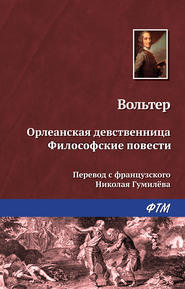По всем вопросам обращайтесь на: info@litportal.ru
(©) 2003-2024.
✖
A Philosophical Dictionary, Volume 02
Настройки чтения
Размер шрифта
Высота строк
Поля
A rapid motion carries round the heavens;
But I – and I alone – resist its force,
Marching secure in my opposing path.
This idea of a first mover turning the heavens round in twenty-four hours with an impossible motion, and of the sun, though acted upon by this first motion, yet imperceptibly advancing from west to east by a motion peculiar to itself, and without a cause, would but embarrass a young beginner.
It is sufficient for him to know that, whether the earth revolves on its own axis and round the sun, or the sun completes his revolution in a year, appearances are nearly the same, and that, in astronomy, we are obliged to judge of things by our eyes before we examine them as natural philosophers.
He will soon know the cause of the eclipses of the sun and the moon, and why they do not occur every night. It will at first appear to him that, the moon being every month in opposition to and in conjunction with the sun, we should have an eclipse of the sun and one of the moon every month. But when he finds that these two luminaries are not in the same plane and are seldom in the same line with the earth, he will no longer be surprised.
He will easily be made to understand how it is that eclipses have been foretold, by knowing the exact circle in which the apparent motion of the sun and the real motion of the moon are accomplished. He will be told that observers found by experience and calculation the number of times that these two bodies are precisely in the same line with the earth in the space of nineteen years and a few hours, after which they seem to recommence the same course; so that, making the necessary allowances for the little inequalities that occurred during those nineteen years, the exact day, hour, and minute of an eclipse of the sun or moon were foretold. These first elements are soon acquired by a child of clear conceptions.
Not even the precession of the equinoxes will terrify him. It will be enough to tell him that the sun has constantly appeared to advance in his annual course, one degree in seventy-two years, towards the east; and this is what Ovid meant to express: "Contrarius evehor orbi"; – "Marching secure in my opposing path."
Thus the Ram, which the sun formerly entered at the beginning of spring, is now in the place where the Bull was then. This change which has taken place in the heavens, and the entrance of the sun into other constellations than those which he formerly occupied, were the strongest arguments against the pretended rules of judicial astrology. It does not, however, appear that this proof was employed before the present century to destroy this universal extravagance which so long infected all mankind, and is still in great vogue in Persia.
A man born, according to the almanac, when the sun was in the sign of the Lion, was necessarily to be courageous; but, unfortunately, he was in reality born under the sign of the Virgin. So that Gauric and Michael Morin should have changed all the rules of their art.
It is indeed odd that all the laws of astrology were contrary to those of astronomy. The wretched charlatans of antiquity and their stupid disciples, who have been so well received and so well paid by all the princes of Europe, talked of nothing but Mars and Venus, stationary and retrograde. Such as had Mars stationary were always to conquer. Venus stationary made all lovers happy. Nothing was worse than to be born under Venus retrograde. But the fact is that these planets have never been either retrograde or stationary, which a very slight knowledge of optics would have sufficed to show.
How, then, can it have been that, in spite of physics and geometry, the ridiculous chimera of astrology is entertained even to this day, so that we have seen men distinguished for their general knowledge, and especially profound in history, who have all their lives been infatuated by so despicable an error? But the error was ancient, and that was enough.
The Egyptians, the Chaldæans, the Jews, foretold the future; therefore, it may be foretold now. Serpents were charmed and spirits were raised in those days; therefore, spirits may be raised and serpents charmed now. It is only necessary to know the precise formula made use of for the purpose. If predictions are at an end, it is the fault, not of the art, but of the artist. Michael Morin and his secret died together. It is thus that the alchemists speak of the philosopher's stone; if, say they, we do not now find it, it is because we do not yet know precisely how to seek it; but it is certainly in Solomon's collar-bone. And, with this glorious certainty, more than two hundred families in France and Germany have ruined themselves.
It is not then to be wondered at that the whole world has been duped by astrology. The wretched argument, "there are false prodigies, therefore there are true ones," is neither that of a philosopher, nor of a man acquainted with the world. "That is false and absurd, therefore it will be believed by the multitude," is a much truer maxim.
It is still less astonishing that so many men, raised in other things so far above the vulgar; so many princes, so many popes, whom it would have been impossible to mislead in the smallest affair of interest, have been so ridiculously seduced by this astrological nonsense. They were very proud and very ignorant. The stars were for them alone; the rest of the world a rabble, with whom the stars had nothing to do. They were like the prince who trembled at the sight of a comet, and said gravely to those who did not fear it, "You may behold it without concern; you are not princes."
The famous German leader, Wallenstein, was one of those infatuated by this chimera; he called himself a prince, and consequently thought that the zodiac had been made on purpose for him. He never besieged a town, nor fought a battle, until he had held a council with the heavens; but, as this great man was very ignorant, he placed at the head of this council a rogue of an Italian, named Seni, keeping him a coach and six, and giving him a pension of twenty thousand livres. Seni, however, never foresaw that Wallenstein would be assassinated by order of his most gracious sovereign, and that he himself would return to Italy on foot.
It is quite evident that nothing can be known of the future, otherwise than by conjectures. These conjectures may be so well-founded as to approach certainty. You see a shark swallow a little boy; you may wager ten thousand to one that he will be devoured; but you cannot be absolutely sure of it, after the adventures of Hercules, Jonas, and Orlando Furioso, who each lived so long in a fish's belly.
It cannot be too often repeated that Albertus Magnus and Cardinal d'Ailli both made the horoscope of Jesus Christ. It would appear that they read in the stars how many devils he would cast out of the bodies of the possessed, and what sort of death he was to die. But it was unfortunate that these learned astrologers foretold all these things so long after they happened.
We shall elsewhere see that in a sect which passes for Christian, it is believed to be impossible for the Supreme Intelligence to see the future otherwise than by supreme conjecture; for, as the future does not exist, it is, say they, a contradiction in terms to talk of seeing at the present time that which is not.
ATHEISM
SECTION I
On the Comparison so Often Made between Atheism and Idolatry
It seems to me that, in the "Dictionnaire Encyclopédique," a more powerful refutation might have been brought against the Jesuit Richeome's opinion concerning atheists and idolaters – an opinion formerly maintained by St. Thomas, St. Gregory Nazianzen, St. Cyprian, and Tertullian – an opinion which Arnobius placed in a strong light when he said to the pagans, "Do you not blush to reproach us with contempt for your gods? Is it not better to believe in no god than to impute to them infamous actions?" – an opinion long before established by Plutarch, who stated that he would rather have it said that there was no Plutarch than that there was a Plutarch, inconstant, choleric, and vindictive – an opinion, too, fortified by all the dialectical efforts of Bayle.
Such is the ground of dispute, placed in a very striking point of view by the Jesuit Richeome, and made still more specious by the way in which Bayle sets it off:
"There are two porters at the door of a house. You ask to speak to the master. He is not at home, answers one. He is at home, answers the other, but is busied in making false money, false contracts, daggers, and poisons, to destroy those who have only accomplished his designs. The atheist resembles the former of these porters, the pagan the latter. It is then evident that the pagan offends the Divinity more grievously than the atheist."
With the permission of Father Richeome, and that of Bayle himself, this is not at all the state of the question. For the first porter to be like the atheist, he must say, not "My master is not here," but "I have no master; he who you pretend is my master does not exist. My comrade is a blockhead to tell you that the gentleman is engaged in mixing poisons and wetting poniards to assassinate those who have executed his will. There is no such being in the world."
Richeome, therefore, has reasoned very ill; and Bayle, in his rather diffuse discourses, has so far forgotten himself as to do Richeome the honor of making a very lame comment upon him.
Plutarch seems to express himself much better, in declaring that he prefers those who say there is no Plutarch to those who assert that Plutarch is unfit for society. Indeed, of what consequence to him was its being said that he was not in the world? But it was of great consequence that his reputation should not be injured. With the Supreme Being it is otherwise.
Still Plutarch does not come to the real point in discussion. It is only asked who most offends the Supreme Being – he who denies Him, or he who disfigures Him? It is impossible to know, otherwise than by revelation, whether God is offended at the vain discourses which men hold about Him.
Philosophers almost always fall unconsciously into the ideas of the vulgar, in supposing that God is jealous of His glory, wrathful, and given to revenge, and in taking rhetorical figures for real ideas. That which interests the whole world is to know whether it is not better to admit a rewarding and avenging God, recompensing hidden good actions, and punishing secret crimes, than to admit no God at all.
Bayle exhausts himself in repeating all the infamous things imputed to the gods of antiquity. His adversaries answer him by unmeaning commonplaces. The partisans and the enemies of Bayle have almost always fought without coming to close quarters. They all agree that Jupiter was an adulterer, Venus a wanton, Mercury a rogue. But this, I conceive, ought not to be considered; the religion of the ancient Romans should be distinguished from Ovid's "Metamorphoses." It is quite certain that neither they nor even the Greeks ever had a temple dedicated to Mercury the Rogue, Venus the Wanton, or Jupiter the Adulterer.
The god whom the Romans called "Deus optimus maximus"– most good, most great – was not believed to have encouraged Clodius to lie with Cæsar's wife, nor Cæsar to become the minion of King Nicomedes.
Cicero does not say that Mercury incited Verres to rob Sicily, though, in the fable, Mercury had stolen Apollo's cows. The real religion of the ancients was that Jupiter, most good and just, with the secondary divinities, punished perjury in the infernal regions. Thus, the Romans were long the most religious observers of their oaths. It was in no wise ordained that they should believe in Leda's two eggs, in the transformation of Inachus's daughter into a cow, or in Apollo's love for Hyacinthus. Therefore it must not be said that the religion of Numa was dishonoring to the Divinity. So that, as but too often happens, there has been a long dispute about a chimera.
Then, it is asked, can a people of atheists exist? I consider that a distinction must be made between the people, properly so called, and a society of philosophers above the people. It is true that, in every country, the populace require the strongest curb; and that if Bayle had had but five or six hundred peasants to govern, he would not have failed to announce to them a rewarding and avenging God. But Bayle would have said nothing about them to the Epicureans, who were people of wealth, fond of quiet, cultivating all the social virtues, and friendship in particular, shunning the dangers and embarrassments of public affairs – leading, in short, a life of ease and innocence. The dispute, so far as it regards policy and society, seems to me to end here.
As for people entirely savage, they can be counted neither among the theists nor among the atheists. To ask them what is their creed would be like asking them if they are for Aristotle or Democritus. They know nothing; they are no more atheists than they are peripatetics.
But, it may be insisted, that they live in society, though they have no God, and that, therefore, society may subsist without religion.
In this case I shall reply that wolves live so; and that an assemblage of barbarous cannibals, as you suppose them to be, is not a society. And, further, I will ask you if, when you have lent your money to any one of your society, you would have neither your debtor, nor your attorney, nor your notary, nor your judge, believe in a God?
SECTION II
Modern Atheists. – Arguments of the Worshippers of God.
We are intelligent beings, and intelligent beings cannot have been formed by a blind, brute, insensible being; there is certainly some difference between a clod and the ideas of Newton. Newton's intelligence, then, came from some other intelligence.
When we see a fine machine, we say there is a good machinist, and that he has an excellent understanding. The world is assuredly an admirable machine; therefore there is in the world, somewhere or other, an admirable intelligence. This argument is old, but is not therefore the worse.
All animated bodies are composed of levers and pulleys, which act according to the laws of mechanics; of liquors, which are kept in perpetual circulation by the laws of hydrostatics; and the reflection that all these beings have sentiment which has no relation to their organization, fills us with wonder.
The motions of the stars, that of our little earth round the sun – all are operated according to the laws of the profoundest mathematics. How could it be that Plato, who knew not one of these laws – the eloquent but chimerical Plato, who said that the foundation of the earth was an equilateral triangle, and that of water a right-angled triangle – the strange Plato, who said there could be but five worlds, because there were but five regular bodieshow, I say, was it that Plato, who was not even acquainted with spherical trigonometry, had nevertheless so fine a genius, so happy an instinct, as to call God the Eternal Geometrician – to feel that there exists a forming Intelligence? Spinoza himself confesses it. It is impossible to controvert this truth, which surrounds us and presses us on all sides.
Argument of the Atheists.
I have, however, known refractory individuals, who have said that there is no forming intelligence, and that motion alone has formed all that we see and all that we are. They say boldly that the combination of this universe was possible because it exists; therefore it was possible for motion of itself to arrange it. Take four planets only – Mars, Venus, Mercury, and the Earth; let us consider them solely in the situations in which they now are; and let us see how many probabilities we have that motion will bring them again to those respective places. There are but twenty-four chances in this combination; that is, it is only twenty-four to one that these planets will not be found in the same situations with respect to one another. To these four globes add that of Jupiter; and it is then only a hundred and twenty to one that Jupiter, Mars, Venus, Mercury, and our globe will not be placed in the same positions in which we now see them.
Lastly, add Saturn; and there will then be only seven hundred and twenty chances to one against putting these planets in their present arrangement, according to their given distances. It is, then, demonstrated that once, at least, in seven hundred and twenty cases, chance might place these planets in their present order.
Then take all the secondary planets, all their motions, all the beings that vegetate, live, feel, think, act, on all these globes; you have only to increase the number of chances; multiply this number to all eternity – to what our weakness calls infinity– there will still be an unit in favor of the formation of the world, such as it is, by motion alone; therefore it is possible that, in all eternity, the motion of matter alone has produced the universe as it exists. Nay, this combination must, in eternity, of necessity happen. Thus, say they, not only it is possible that the world is as it is by motion alone, but it was impossible that it should not be so after infinite combinations.
Answer.
All this supposition seems to me to be prodigiously chimerical, for two reasons: the first is, that in this universe there are intelligent beings, and you cannot prove it possible for motion alone to produce understanding. The second is, that, by your own confession, the chances are infinity to unity, that an intelligent forming cause produced the universe. Standing alone against infinity, a unit makes but a poor figure.
Again Spinoza himself admits this intelligence; it is the basis of his system. You have not read him, but you must read him. Why would you go further than he, and, through a foolish pride, plunge into the abyss where Spinoza dared not to descend? Are you not aware of the extreme folly of saying that it is owing to a blind cause that the square of the revolution of one planet is always to the squares of the others as the cube of its distance is to the cubes of the distances of the others from the common centre? Either the planets are great geometricians, or the Eternal Geometrician has arranged the planets.
But where is the Eternal Geometrician? Is He in one place, or in all places, without occupying space? I know not. Has He arranged all things of His own substance? I know not. Is He immense, without quantity and without quality? I know not. All I know is, that we must adore Him and be just.

















